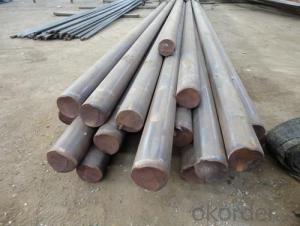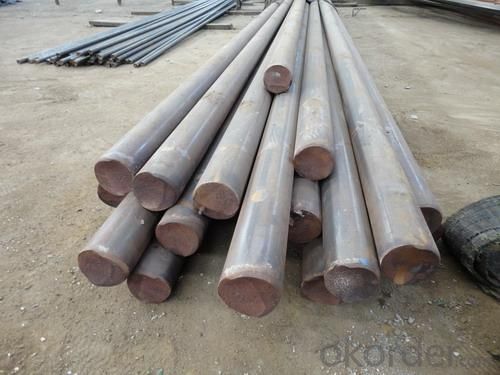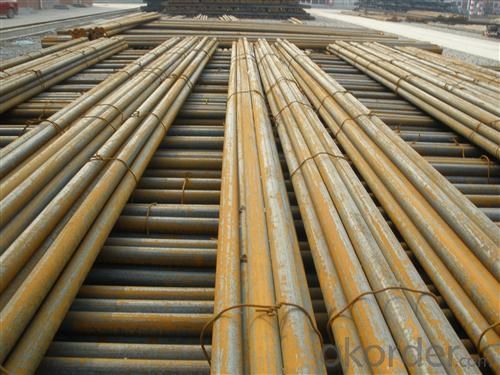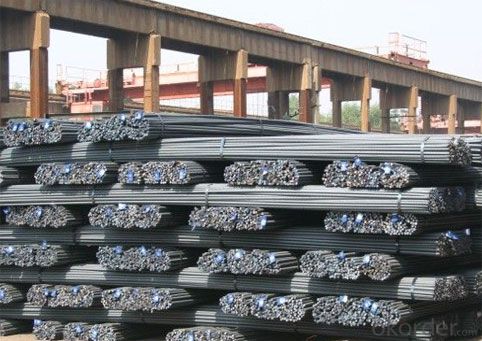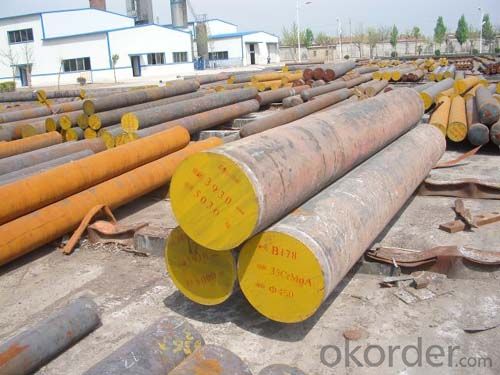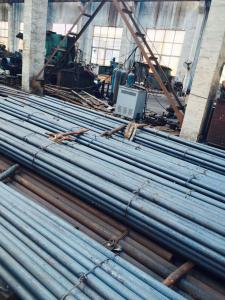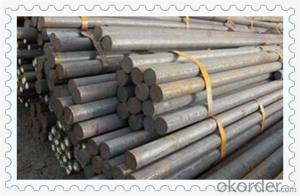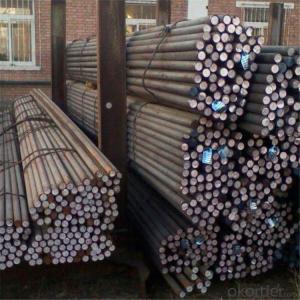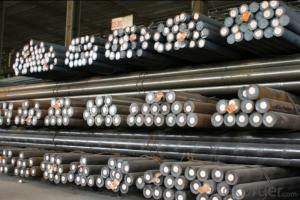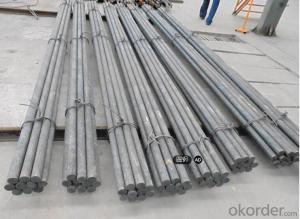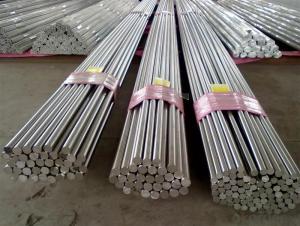Cold Drawn AISI 1045 Carbon Steel Round Bars
- Loading Port:
- China main port
- Payment Terms:
- TT or LC
- Min Order Qty:
- 25 m.t.
- Supply Capability:
- 10000 m.t./month
OKorder Service Pledge
OKorder Financial Service
You Might Also Like
Specification
The details of our Steel
1. Produce Standard: as the GB, AISI, ASTM, SAE, EN, BS, DIN, JIS Industry Standard
2. Produce processes: Smelt Iron -EAF smelt Billet - ESR smelt Billet -Hot rolled or forged get the steel round bar and plate
3. Heat treatment:
Normalized / Annealed / Quenched+Tempered
4. Quality assurance:
All order we can received Third party inspection, You can let SGS, BV,.. and others test company test and inspect our products before Goods shipping.
Product information
1.ChemicalComposition(%) |
carbon:0.43-0.50 Silicon:0.10-0.35 Manganese: 0.60-0.90 |
2.Equivalent Grades | SAE1045,AISI C1045,S45C,C45 |
3.Form&Size | 1)1045 carbon Steel round bars, flat/square bars,plates,sheets. |
2)AISI 1045 carbon steel Size Available(Length can be customized) | |
4.Round bar | 16mm-690mm Dia |
5. Typical Mechanical Properties | Tensile strength Mpa:640 Yield strength Mpa:410 Elongation in 50% mm %:22 Impact lzod J:170-210 Hardness:HB 187 / HRC 10 |
6.Machining | AISI 1045 steel has good machinability in normalized as well as the hot rolled condition. Based on the recommendations given by the machine manufacturers, operations like tapping, milling, broaching, drilling, turning and sawing etc. can be carried out on AISI 1045 steel using suitable feeds, tool type and speeds. |
7.Welding | AISI 1045 steel is readily welded when correct procedure is followed. Welding AISI 1045 steel in through-hardened, tempered and flame or induction hardened condition is not recommended. Low hydrogen electrodes are preferred for welding AISI 1045 steel. The workpiece is Pre-heated at 200°C–300°C (392°F - 572°F) Maintained at the same temperature during welding Cooled slowly using sand, ashes etc and Stress relieved at 550°C - 660°C (1022°F - 1220°F). |
8.Related Specifications | W.Nr 1.0503 C45 W.Nr 1.1191 CK45 AISI C1045 ASTM A29/A29M-91 1045 SAE 1045 UNS G 10450 |
9.HeatTreatment | Annealing:Heat to 800°C-850°C hold until temperature is uniform throughout the section,and cool in furnace. |
Hardening:Heat to 800°C-850°C hold until temperature is uniform throughout the section,soak for 10-15 minutes per 25mm of section,and quench in water or brine.or Heat to 830°C -860°C soak as above and quench in oil.Temper immediately while still hand warm. | |
Tempering:Re heat to 400°C-650°C as required,hold until temperature is uniform throughout the section,soak for 1 hour per 25mm of section,and cool in still air. | |
10.Quality Certificate | 1)Grade,Size,Quantity in Number & Weight |
Product show

Workshop show

- Q: Are there any international standards for special steel?
- Yes, there are international standards for special steel. These standards are developed and maintained by various organizations such as the International Organization for Standardization (ISO) and the American Society for Testing and Materials (ASTM). These standards ensure that the special steel products meet specific criteria for their composition, properties, and performance, enabling global consistency and compatibility in the industry.
- Q: How is special steel used in the mining manufacturing process?
- Special steel is used in the mining manufacturing process for various applications such as drill bits, crushing equipment, conveyor systems, and structural components. Its exceptional strength, durability, and resistance to wear and corrosion make it ideal for withstanding the harsh conditions of mining operations and ensuring the efficiency and reliability of mining machinery and infrastructure.
- Q: How does special steel contribute to the automotive noise reduction?
- Special steel contributes to automotive noise reduction through its unique properties and manufacturing processes. Special steels, such as high-strength steel and acoustic steel, are specifically designed to absorb or dampen vibrations and sound waves, resulting in reduced noise levels within the vehicle cabin. These steels possess enhanced damping characteristics, which help to minimize the transmission of noise generated by the engine, road, and other external sources. Additionally, special steel's superior strength and stiffness properties allow for the design of lighter and more rigid vehicle structures, which further aid in noise reduction by reducing vibrations and minimizing the potential for rattling noises. Overall, the use of special steel in automotive applications plays a crucial role in enhancing overall driving comfort and reducing noise pollution.
- Q: What are the different methods for quenching special steel?
- Achieving the desired mechanical properties and improving the hardness and strength of special steel requires a critical step in the heat treatment process known as quenching. There are several methods available, each with their own advantages and considerations. One commonly used method is oil quenching, where the steel component is submerged in oil to act as a cooling medium. This provides a moderate cooling rate, allowing for controlled and uniform hardening. It is suitable for a wide range of steel grades and helps prevent cracking or distortion. Water quenching, on the other hand, is a faster cooling method compared to oil quenching. It extracts heat rapidly, resulting in higher hardness and strength. However, the high cooling rate can increase the risk of cracking or distortion, especially with thicker sections. Water quenching is commonly used for low-alloy steels and some high-alloy steels. Polymer quenching involves using a specialized polymer solution as the cooling medium. This method offers a controlled cooling rate, striking a balance between the slower oil quenching and faster water quenching. It is particularly suitable for steels with complex shapes or critical dimensions, as it reduces the risk of distortion and cracking. Air quenching, on the other hand, is a slower cooling method that allows the steel component to cool in ambient air. It is typically used for steels with lower hardenability, providing a more gradual cooling rate. While it helps reduce the risk of distortion and cracking, it may result in lower hardness and strength compared to other quenching methods. Finally, salt bath quenching involves immersing the steel component in a molten salt bath as the cooling medium. This method provides a controlled and uniform cooling rate, minimizing the risk of distortion and cracking. It is particularly suitable for complex-shaped or delicate parts, as it reduces thermal stress during cooling. It is important to consider various factors, such as steel grade, desired hardness, component size and shape, and required mechanical properties when choosing a quenching method. Proper selection and implementation of the method are crucial to achieving the desired material characteristics and ensuring the overall quality of the special steel product.
- Q: How is alloy steel used in the manufacturing of gears and shafts?
- Alloy steel is commonly used in the manufacturing of gears and shafts due to its superior strength, durability, and resistance to wear and tear. This type of steel is created by combining iron with other elements, such as manganese, nickel, chromium, or molybdenum, to enhance its mechanical properties. The alloying elements increase the hardness, toughness, and heat resistance of the steel, making it ideal for handling the high stresses and loads experienced by gears and shafts in various machinery and automotive applications. Additionally, alloy steel can be heat-treated to further improve its strength and wear resistance, ensuring the longevity and reliability of gears and shafts in demanding operating conditions.
- Q: What are the requirements for special steel used in wind turbines?
- The reliability, efficiency, and durability of large-scale renewable energy systems, such as wind turbines, rely heavily on the crucial requirements for special steel. Here are some key considerations: 1. Strength and Durability: To withstand the harsh operating conditions, including strong winds, vibrations, and extreme temperature variations, wind turbine steel must possess exceptional strength and durability. Its high fatigue resistance allows it to endure cyclic loading over the turbine's operational life, which can span up to 20-25 years. 2. Corrosion Resistance: Wind turbines often face corrosive saltwater and salt-laden air in coastal or offshore environments. As a result, the special steel used must exhibit superb corrosion resistance to prevent degradation and ensure long-term performance. 3. Weldability: The steel chosen for wind turbines should be suitable for welding processes, enabling efficient fabrication and assembly of turbine components. Excellent weldability streamlines construction and maintenance, reducing downtime and associated costs. 4. Low Temperature Toughness: Wind turbines are frequently situated in cold regions, such as arctic or mountainous areas. Consequently, the special steel employed must possess good low-temperature toughness, ensuring its mechanical properties remain intact even in frigid climates. 5. Magnetic Properties: Wind turbines utilize electrical components like generators and transformers, which operate within electromagnetic fields. The special steel used in these components should possess specific magnetic properties to minimize energy losses and maximize electrical system efficiency. 6. Cost-effectiveness: While meeting all the aforementioned requirements, the special steel employed in wind turbines must also be cost-effective. Striking a balance between performance and cost ensures the economic viability of wind energy projects. Meeting these requirements is vital for the long-term operation and sustainability of wind turbines, enabling them to generate clean and renewable energy efficiently.
- Q: How does special steel play a role in the defense sector?
- The defense sector heavily relies on special steel because of its unique properties and characteristics, which make it highly suitable for various applications. Firstly, special steel possesses exceptional strength and durability, making it perfect for the manufacturing of military vehicles, armored personnel carriers, and tanks. These vehicles necessitate materials that can withstand high impacts, resist deformation, and provide protection against enemy attacks. Additionally, special steel finds its use in the production of military aircraft and naval vessels. Its high strength-to-weight ratio enables the construction of lightweight yet sturdy structures, allowing aircraft to carry heavy payloads and naval vessels to navigate through harsh conditions. Furthermore, special steel's resistance to corrosion makes it ideal for marine environments, ensuring the long lifespan and reliability of naval assets. Furthermore, special steel is utilized for the manufacturing of weapons and ammunition. Its hardness and toughness make it suitable for producing firearm barrels, armor-piercing projectiles, and other critical components. The ability of special steel to withstand extreme pressures, temperatures, and impact forces guarantees the accuracy, reliability, and effectiveness of military weaponry. Moreover, special steel is employed in the defense sector for the production of communication and surveillance equipment. Its electromagnetic properties allow for the creation of radar systems, antennas, and electronic enclosures, which are crucial for military operations. Special steel's resistance to electromagnetic interference ensures the integrity and security of communication systems, thereby enhancing the overall efficiency and effectiveness of defense operations. In conclusion, special steel plays a vital role in the defense sector by providing the necessary strength, durability, corrosion resistance, and electromagnetic properties for various applications. Its utilization in military vehicles, aircraft, naval vessels, weapons, and communication equipment enhances the overall capabilities, effectiveness, and safety of defense forces, thereby ensuring national security.
- Q: Can special steel be used in the defense industry?
- Yes, special steel can be used in the defense industry. Special steel alloys are often used in the manufacturing of military vehicles, aircraft, naval vessels, and weaponry due to their exceptional strength, durability, and resistance to corrosion. These properties make special steel an ideal material for critical components and structures that require high performance and reliability in defense applications.
- Q: How does the heat treatment process affect special steel?
- The heat treatment process greatly affects special steel by altering its microstructure and improving its mechanical properties. It involves heating the steel to a specific temperature and then cooling it in a controlled manner. This process can increase the steel's hardness, strength, toughness, and wear resistance, making it suitable for various applications in industries such as automotive, aerospace, and tool manufacturing. Additionally, heat treatment can also enhance the steel's dimensional stability and corrosion resistance, further improving its overall performance.
- Q: What are the requirements for special steel used in chemical processing?
- The requirements for special steel used in chemical processing include high corrosion resistance, exceptional strength and durability, resistance to high temperatures and extreme pressure, and compatibility with the specific chemicals being processed.
Send your message to us
Cold Drawn AISI 1045 Carbon Steel Round Bars
- Loading Port:
- China main port
- Payment Terms:
- TT or LC
- Min Order Qty:
- 25 m.t.
- Supply Capability:
- 10000 m.t./month
OKorder Service Pledge
OKorder Financial Service
Similar products
Hot products
Hot Searches
Related keywords
